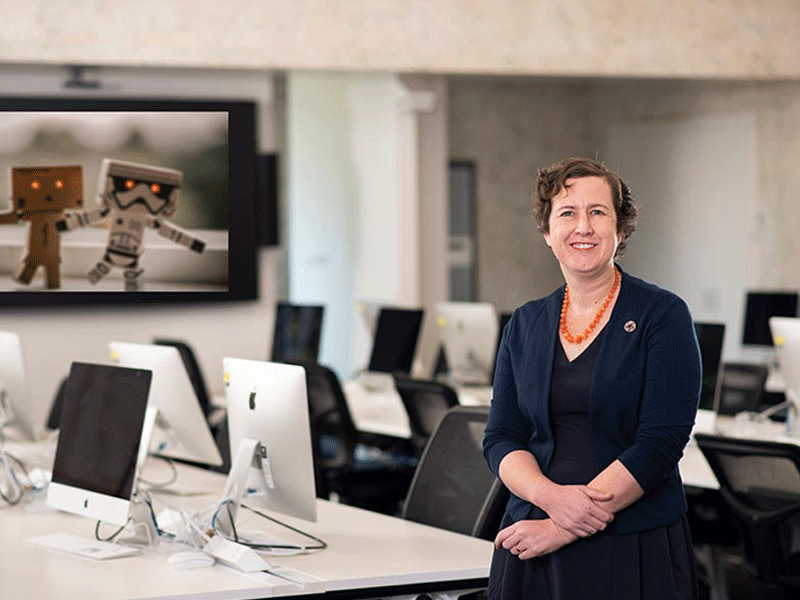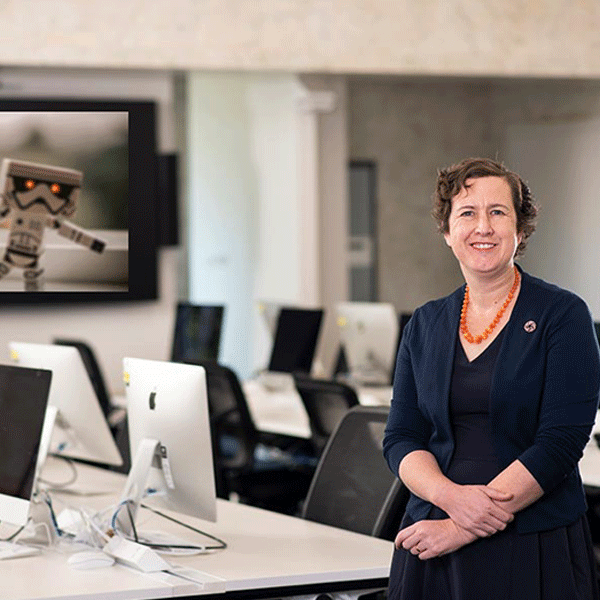Researcher Highlights
Emerging frontiers of education technology
Rachel Buchanan
In this world of rapidly changing technology, what lies ahead for teachers, students and the world of education? Dr Rachel Buchanan is researching the role of technology in the Australian education system.

With the latest Gonski report proclaiming principles to improve school performance and student achievement, the addition to the classroom of emerging technologies such as virtual reality and the ever-increasing prevalence of social media, the convergence of education and technology is an area that is becoming increasingly complicated.
Dr Rachel Buchanan is working to map out the frontlines of education technology through her research that has equity at its heart.
She was the first in her family to attend university and soon felt the impacts of inequity in education during her undergraduate studies when issues of access to technology became apparent. When she took on an academic role she soon began to question the assumption that students are digital natives, more at home in the terrain of cyberspace than any other generation.
“It didn’t ring true with my experience of the students I was teaching. I teach in teacher education and I was seeing quite an uneven understanding of how to use technology in my students. So I started looking at that idea of technology and equity and who was coming to university with technology knowledge and skills,” Dr Buchanan said.
Over the past 10 years Dr Buchanan has examined how equity issues affect the way students access, understand and use technology in educational settings.
Since being awarded a Women in Research Fellowship in 2018 she has commenced a new project called Emerging Frontiers of Education Technology which covers three strands: teaching students how to build a positive online presence, personalised learning and how that is understood in the educational policy context, and pedagogies of virtual reality.
“The fellowship has been really helpful as it has afforded me the time and space to focus on my research in this area. I’m also looking forward to the mentoring opportunities the fellowship offers to help build my leadership skills,” Dr Buchanan said.
Building a positive online presence
Following on from Dr Buchanan’s 2015 Equity and Digital Footprint project, is her work that examines how schools can help students to develop a positive online presence.
“Choosing to avoid all involvement in online activity is not an option for young people, especially moving into the future as more organisations use social media to vet their applicants,” she said.
“I don’t mean schools should be encouraging students to be public online, but they should build on the knowledge young people already have about online safety and teach them about profile curation.”
“This is about showing students you can make some things public but be still careful about what you choose to share. For example, you can use a pseudonym which is a good way of creating a stable online identity and then when appropriate transition to using your real name.”
Dr Buchanan has also been running workshops with students, parents and teachers with the aim of connecting what students are doing in their own time online with things they have to do at school.
“A lot of boys, for example, are playing Fortnight and there’s this moral panic about how terrible that game is, but actually we’re also seeing leadership, cooperative skills, and planning and strategy skills develop through the use of that game.”
“I’m questioning whether there are ways that schools can use technology to help showcase those positive skills.”
Pedagogies of virtual reality
Dr Buchanan has partnered with the University of Newcastle’s Dr Debra Donnelly on another project that maps how school teachers are currently using virtual reality.
“People might think that it’s teachers who are gamers who are the ones bringing virtual reality into schools, but we’re finding it’s the teachers that we’ve called ‘enthusiastic amateurs’. They think ‘this would be really good for my students’ and then teach themselves in their own time about different virtual reality products and work to get them into their classrooms,” Dr Buchanan observed.
From marine biology, to science, language learning and history, teachers are using virtual reality in a variety of different ways.
“Some schools are doing Google expeditions and are taking students on virtual tours around the Blue Mountains with an Indigenous commentary. They are learning about the dreaming and country through packages put together by Indigenous guides,” Dr Buchanan said.
Through this project Dr Buchanan will collect data and document the virtual reality products teachers are using and subject areas they use it for.
“We’re also looking at what problems teachers encounter. It’s very time consuming to set up a virtual reality space and interestingly, virtual reality seems to be working better in primary schools where the timetable is more flexible. We’re finding it’s often being led by teacher librarians.”
Following on from an online survey to gather data, Dr Buchanan will visit schools to look at the virtual reality setups created by teachers and document these in a series of case studies.
“Most schools were set up in the 19th century and now we have this 21st century technology which calls for a unique space. Teachers are doing creative things to develop virtual reality spaces and they’re not letting the fact they don’t have a dedicated space stop them from using it.”
Once the results have been collated Dr Buchanan and Dr Donnelly will run a show case event and create a practice guide to allow schools to learn from each other.
Understanding personalised learning
A third strand of Dr Buchanan’s education technology research is based around unpacking the term ‘personalised learning’ and what it means for different educators and its possibilities for education policy.
“This focus on personalised learning stems from the 2018 government report ‘Through Growth to Achievement’ which was heralded in the media as a sign the government wants to introduce personalised learning. But what I am finding is a big disparity in what people think personalised learning is,” she observed.
Dr Buchanan says that for some teachers it’s about differentiating their normal classroom practice and for others it’s using technological products that incorporate learning analytics that determine what students learn and when they learn it.
“There’s a whole range of meanings, personalised learning has become a buzzword. I’m trying to understand what might be the benefits and pitfalls of the particular model of technological personalised learning framed in the government report.”
The University of Newcastle acknowledges the traditional custodians of the lands within our footprint areas: Awabakal, Darkinjung, Biripai, Worimi, Wonnarua, and Eora Nations. We also pay respect to the wisdom of our Elders past and present.
